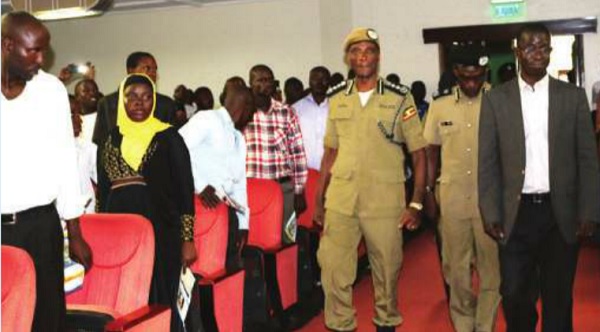
As part of celebrations of the police week that fall every first week of October when Uganda attained her Independence, the Uganda police on Saturday Oct.1 held the 2nd Erinayo Oryema memorial lecture at Makerere University main hall with a theme “Police is the public and Public is the Police” fostering community policing in Uganda.
Police spokesperson Andrew Felix Kawesi while welcoming IGP Kale Kaihura said, “Today is another great event in our history when we congregate here to remember and commemorate a great son of this country who was the first black inspector general of police.”
Before inviting the main discussant of the day, former Makerere University don Fredrick Golooba Mutebi, Kawesi told the gathering how the police was implementing its community policing as a way of enhancing security.
When Prof. Golooba Mutebi took to the podium he started on a diplomatic note saying he was surprised why the police had chosen him to make the presentation.
As he delved deeper into his presentation Golooba had no kind words for the police saying,
“Many people have pronounced the police as the science of governing men and not women, and in some instance the police is also seen as a single occupational organisation providing services that serve the interests of the state which include the power to regulate, to arrest, to fine, to incarcerate and to use deadly force.”
Golooba noted that the police derives authority from the state to regulate and protect the social order which authority allows the police to be domestic specialists in the exercise of legitimate force.
“In everything that I have said there is no reference to the role of the community and this poses the question what does it mean when one says the public is the police and the police is the public?” said Golooba.
“On the surface the theme of today’s discussion could easily strike one as an empty public relations slot. However in my situation it captures two very important aspects of policing.
“At the very basic level police officers are us the members of the public and the reason for that is very simple; because the police recruits from among us. The problems they try to solve affect us and them in equal measure because at the end of the day they and their immediate and extended family live in the same communities where the rest of us live.”
Golooba said at a more complex level the police cannot be effective if they detach themselves from the community they seek to serve. Under normal circumstances because of logistical and other issues the police has limited reach and the police in every country does not reach everywhere or does not have a presence in every corner of the country where they work.
Golooba said, “To be effective any police force must extend its reach into areas where it may not be possible to have a constant presence inform of police stations or posts for instance in isolated places. Therefore collaboration with the community helps extend the reach of police, engaging members of the public to take responsibility of some responsibility for their own security while they engage with the police where there is need for specific intervention. The community cannot be safe if they isolate themselves from the police.”
Golooba highlighted some benefits to instituting the system of community policing and said the three key ones include: Community policing facilitates collaboration between communities and the police. Local community policing which is usually packed as a bridge between the police and the community in crime prevention and in resolution of conflicts. Community policing is a good mechanism through which members of the public become critical sources of information for the police.
When she took to the podium to discuss Golooba`s presentation, Makerere University don Helen Nambalirwa Nkabala; a coordinator of the Peace and Conflict studies at MuK was all praise for the police. She said there could be no better community policing than was exemplified by the days gathering at Makerere.
Nkabala said what Golooba saying about people in other countries having people with gainful employment as community police enforcers is not for Uganda.
When IGP Kaihura took to the podium he agreed with the don’s saying the police like any other institution has weaknesses and they are working on them.
“Uganda has 11 million community police personnel working on voluntary basis adding, the police is like any community where you have both well behaved and ill-behaved people and that they are working on weeding out the wrong elements,” he said.
****
editor@independent.co.ug
 The Independent Uganda: You get the Truth we Pay the Price
The Independent Uganda: You get the Truth we Pay the Price


